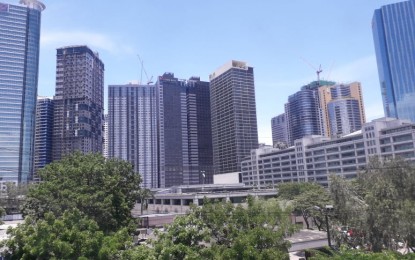
File photo
MANILA – Economic managers have reduced their target of the country’s gross domestic product (GDP) this year from 6.5-7.5 percent to 6-7 percent due partly to the enhanced community quarantine (ECQ) from March 27 to April 11 in the National Capital Region (NCR) Plus.
In a virtual briefing after the meeting of the inter-agency Development Budget Coordination Committee (DBCC) Tuesday, Budget and Management Secretary and DBCC chair Wendel Avisado said impact of the increase in coronavirus disease (Covid-19) variants has been also factored in the reduction in the GDP target for this year.
Avisado said DBCC members also expect economic growth next year to improve to between 7-9 percent and return to the pre-pandemic level of 6-7 percent in 2023 and 2024.
In the first quarter this year, GDP posted a 4.2-percent contraction, an improvement from the -8.3 percent in the previous quarter but weaker than the 0.7 percent in the first quarter of 2020.
Avisado said the new growth targets were approved by economic managers taking into account the first-quarter domestic output.
“Our growth prospects and economic recovery will be underpinned by three interventions to arrest the spread of the virus and help the poor cope with the impact of the quarantines,” he said.
These interventions are the strengthened implementation of the prevent, detect, isolate, treat, and recover (PDITR) strategy; and full vaccination of the people in highest risk areas like the NCR, Bulacan, Rizal, Laguna, and Cavite or the NCR Plus, Pampanga, Cebu City, and Davao City.
These also include cut in the timeframe for the detection and isolation of Covid-19 positive cases from seven to five days, and the eventual Congress’ approval of the proposed PHP170 billion worth of supplementation social protection financing for those who are greatly affected by the pandemic and to fund the improvement of health protocols.
Spending program was also increased from PHP4.66 trillion to PHP4.74 trillion while it is seen to rise to PHP4.95 trillion next year, to PHP5.11 trillion in 2023 and to PHP5.4 trillion in 2024 amid the higher requirements caused by the pandemic.
Avisado said funds for the proposed Growth Equity Fund (GEF), based on the Supreme Court (SC) decision on the Mandanas-Garcia case, were incorporated in the spending program until 2024.
SC’s ruling on the Mandanas-Garcia petition provides for higher resources for local government units (LGUs) since funding for LGUs’ internal revenue allotment (IRA) share should come from national taxes and not just the national internal revenue taxes.
During the same briefing, Socioeconomic Planning Secretary and National Economic and Development Authority (NEDA) Director General Karl Kendrick Chua said the growth assumption for this year has taken into consideration the management of risks relative to last year, the acceleration of the Covid-19 vaccination program in higher risk areas, and the usage of digitally-assisted measures to improve contact tracing.
He said the herd immunity aim for the Philippines depends on the speed of vaccination but added there will still be “chances of sporadic lockdowns” but “risk-determined” or through localized lockdowns.
Chua said the growth target for this year can be achieved if outputs from the second to fourth quarter of the year will be about 10 percent.
“When we announced the first-quarter GDP, NEDA has computed something like 10 percent for the next three quarters so that we end up with the 6 percent, more or less,” he said.
Meanwhile, the DBCC kept the 2-4 percent inflation target until 2024, as monetary officials see the sustained decline in domestic rate of price increases starting in the last quarter of 2021.
Projection for Dubai crude oil prices is estimated at between USD50-70 per barrel; the Philippine peso to US dollar exchange rate to be around PHP48 to PHP53 for this year until 2024; the 364-day Treasury bill (T-bill) rate to be between 2-3 percent for this year; 2-3.5 percent for 2022, and between 2.5-4 percent for 2023-2024; the six-month London Interbank Offered Rate (LIBOR) is still at 0.2 to 1.2 percent for 2021, 0.3-1.3 percent for 2022, 0.5-1.5 percent for 2023, and 1-2 percent for 2024.
Goods exports are seen to rise by 8 percent this year and 6 percent next year; goods imports expansion is expected to be around 2 percent this year and 10 percent next year; and goods exports are seen to rise by 6 percent this year and 8 percent next year.
Services exports growth assumption is 6 percent for this year until 2024 while services imports assumption is 7 percent for this year and 8 percent for 2022-2024.
The revenue program for this year was kept at PHP2.88 trillion while it is at PHP3.29 trillion for 2022, PHP3.59 for 2023, and PHP4 trillion for 2024.
Deficit ceiling for this year was raised to 9.4 percent of GDP and to 7.7 percent of GDP for 2022, but down to 6.4 percent of domestic output in 2023 and 5.4 percent of GDP in 2024. (PNA)
